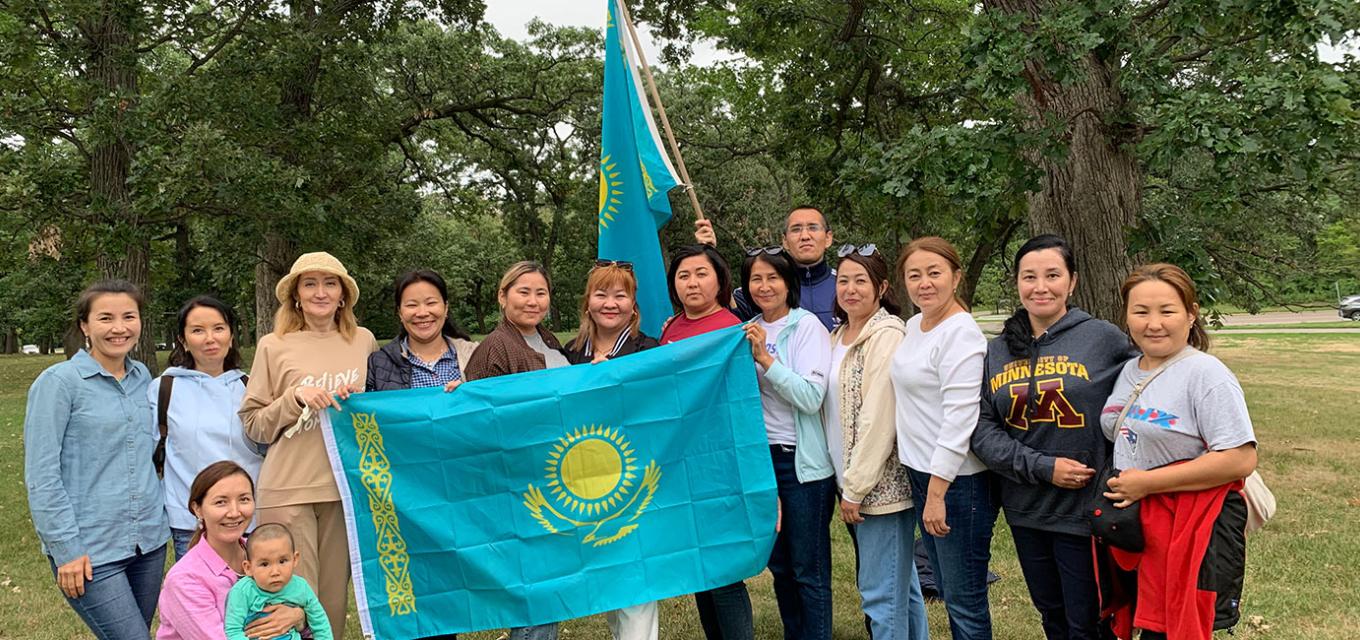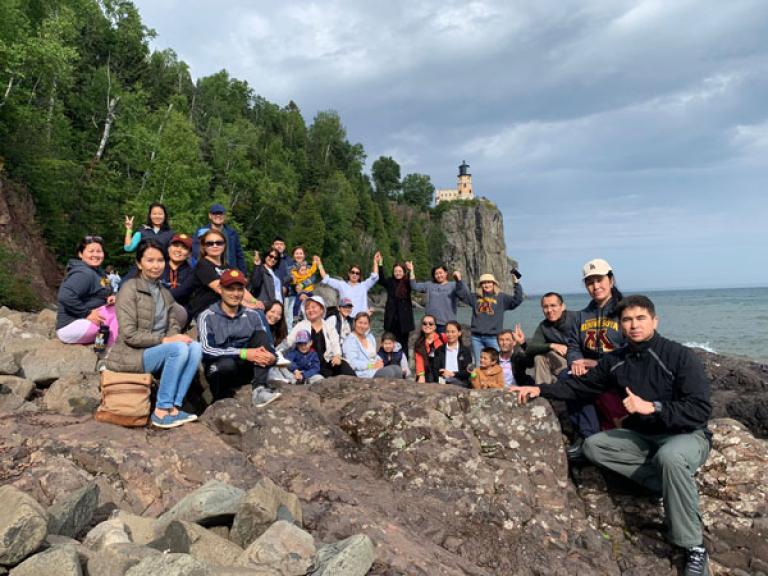2023 Winter

Cross-continental collaboration
CEHD hosts 14 Kazakhstan scholars for a six-month research and leadership program.
Zhanat Momynkulov says he had always dreamed about visiting and studying in the United States because of its strong academic and research traditions. From June to November 2022, he got his chance as part of the first CEHD Bolashaq Visiting Scholar Program.
For six months, 14 scholars from the Central Asian country of Kazakhstan visited CEHD to participate in a customized program to build knowledge and capacity in research methods, innovative teaching approaches, and academic leadership.
Momynkulov, a senior research fellow at the Academy of Public Administration of Kazakhstan, says he was thrilled at the opportunity to study at CEHD. “I wanted to learn the core basics of the American system of research in higher education. CEHD is one of the leading schools in education across the nation,” he says. “I am interested in politics and international relations, but I preferred education because it is easier to achieve social transformation in my country with the help of education and human development rather than by administrative reforms.”
The Bolashaq Scholar Program is hosted by CEHD International Initiatives and is funded by the Bolashaq International Scholarship, a highly prestigious fellowship supported by the government of Kazakhstan. The program supervisor herself is a Bolashaq Scholarship recipient. Zhuldyz Amankulova, a current doctoral candidate in the Department of Organizational Leadership, Policy, and Development (OLPD), had been interested in expanding the collaborations between Kazakhstani institutions and the University for some time. “As of 2019-2020, the University of Minnesota had fewer than 10 students from Kazakhstan,” she says.
Amankulova saw an ideal opportunity when her government announced a new program aimed at sending 500 scholars annually for internships to leading universities and research centers around the world. In collaboration with International Initiatives Director Marina Aleixo, Amankulova helped design the CEHD Bolashaq Visiting Scholar Program.
The six-month cohort program includes one-on-one collaboration with host faculty, an intensive schedule of academic seminars and workshops, on and off campus activities, and individualized time for research planning.
“We enjoyed the beautiful and colorful landscape of Minnesota,” Momynkulov says. Scholars participated in several organized cultural activities, including a visit to Duluth and the State Fair. “As for the program, we learned a lot not only about American higher education, but also qualitative research methods in social sciences,” he says.

Photo credit(s): Courtesy of CEHD International Initiatives
Momynkulov says he was struck by many things during this experience—the hot Minnesota summer weather, the beautiful architecture of campus buildings, and the culture of equality and individualism. “I was quite astonished by academic freedom,” he says. “In my country, professors in their sessions will try to make sure students accept the taught knowledge. But in the U.S., everything seems limitless and everybody understands the taught subject differently.”
Like Momynkulov, Azhar Mankhanova jumped at the chance to study in the United States. “I am familiar with the higher education of European universities,” she says. “That’s why I wanted to visit an American university.”
Mankhanova is the head of the educational and methodical department at Kazakh-British Technical University. The main responsibility of the department is to ensure that the educational process in the university follows the requirements of the ministry of education.
“Kazakhstan has more centralized control over higher education than the United States,” Mankhanova says. “Standards set by the ministry are followed by all universities of the country.”
Because her position requires managerial decisions, she liked the fact that the scholar program was partly focused on management in education and science.
“There were some ideas I had been thinking about even before taking part in the program,” she explains. “The program helped me become stronger in my will to implement things like a student advising unit for undergraduate programs, first-year experience courses for freshmen, and so on.”
Helping bring shape to Mankhanova’s thoughts was her CEHD host faculty, OLPD Professor Bhaskar Upadhyay. “We work on whatever resource or ideas they want to talk about,” he says, such as how to support undergraduate students from rural areas, making STEM instruction more appropriate in local contexts, and helping the scholars get their research recognized, which Upadhyay finds particularly important.
Through his work with the scholars, Upadhyay sees benefits for CEHD as well. “This is a great experience for us to build a relationship with institutions with whom we can share our learning and hopefully build a lasting relationship that will allow us to collaborate in other ways,” he says. “Also, this engagement allows our University and college to be promoted in other countries as a place of learning and the place to go.”
OLPD Professor Andrew Furco, who was Momynkulov’s host faculty, agrees that the exchange of information was valuable to both sides. “Being part of the Bolashaq program was immensely rewarding and enriching in that I had the opportunity to learn about the changing nature of higher education in Kazakhstan, and the inspiring social, economic, and cultural developments taking place across the country,” he says. “Although the U.S. and Kazakhstan are miles apart and very different in many ways, it was intriguing to find many similarities in the aspirational goals we have for our respective communities and higher education systems.”
The program also created an opportunity for interdisciplinary and intercollegiate collaboration. In addition to CEHD faculty, the program involved faculty from other colleges and programs. “It has been amazing to see the positive response from so many faculty and staff, in and outside CEHD, to our requests to engage in the program,” says Aleixo. “They have given their time leading workshops, opened their classrooms for observations, and joined cultural events.”
Additionally, the 14 visiting scholars from Kazakhstan also come from different institutions and disciplinary backgrounds. The program has allowed them to learn from each other and develop meaningful relationships that will hopefully grow into academic partnerships once they return home.
These mutual benefits Amankulova believes give the Bolashaq Visiting Scholar Program its strength and will allow it to grow. “I hope this program is the start for further collaboration and exchange between CEHD partners, scholars, and their home institutions,” she says. “I hope the collaboration sparks further interest from both sides to continue learning and exchanging ideas and skills.”
As the current program wraps up this fall, CEHD is already busy preparing for the 2023 cohort.
-KEVIN MOE